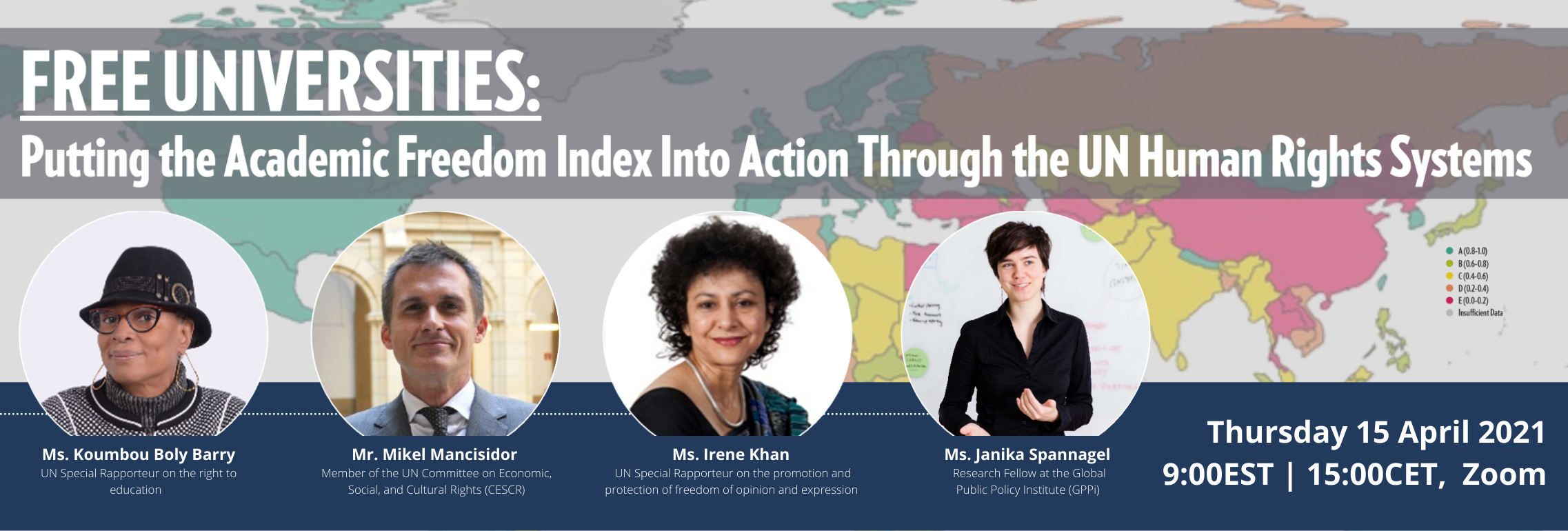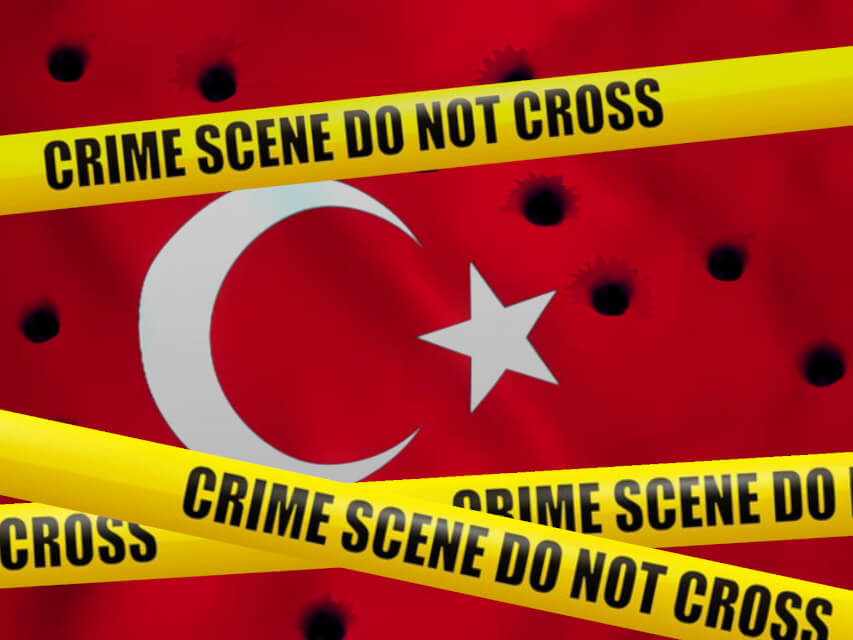The Global Public Policy Institute (GPPi), Friedrich-Alexander-
The data is publicly available and includes more than 140,000 observation points, several indicators, and an aggregate index on academic freedom, which is based on a Bayesian measurement model. The AFi is a robust tool for research, and it also serves to inform policy debates among elected officials, research funders, university communities, and advocates in general. Join us on Thursday, April 15 to consider how the index can be put into action. (See below.)

Join UN representatives, GPPi, FAU, SAR, and our global partners on Thursday, April 15th for this high-level webinar that will present the Academic Freedom Index (AFi) as a robust instrument that can inform research and drive human rights policy debates among government officials, parliamentarians, research funders, university administrators, academics, students, and advocates.
Featuring:
- Ms. Irene Khan, UN Special Rapporteur on the promotion and protection of freedom of opinion and expression
- Ms. Koumbou Boly Barry, UN Special Rapporteur on the right to education
- Mr. Mikel Mancisidor, Member of the UN Committee on Economic, Social and Cultural Rights (CESCR)
- Ms. Janika Spannagel, Research Fellow at the Global Public Policy Institute (GPPi)
When: Thursday, April 15th at 9:00 EST | 15:00 CET
This event is sponsored by:

Lines, Line Drawing, and Consequences: An Academic Freedom Discussion Series
 From April 14th to June 9th, SAR Executive Director Rob Quinn will lead a bi-weekly discussion to examine one of five archetypal values-related situations that arise on US campuses: (i) responding to demands for exclusion or removal; (ii) tensions around expression in public vs. private campus spaces; (iii) distinguishing academic freedom from free speech; (iv) external pressures on campus discourse; and (v) navigating foreign partnerships.
From April 14th to June 9th, SAR Executive Director Rob Quinn will lead a bi-weekly discussion to examine one of five archetypal values-related situations that arise on US campuses: (i) responding to demands for exclusion or removal; (ii) tensions around expression in public vs. private campus spaces; (iii) distinguishing academic freedom from free speech; (iv) external pressures on campus discourse; and (v) navigating foreign partnerships.
Co-sponsored by the SAR-United States Section, the sessions will be interactive, draw on recent case examples, and provide participants tools for assessing incidents and developing pro-values responses for their campus. Scheduled for every other Wednesday, each session is open to all persons at SAR network member organizations. To check if your organization is a member of SAR, click here. Persons at organizations that are not members of the SAR network or members of the public interested in attending may register and will be invited to attend subject to capacity limits.
Wednesday, April 14, 12:00PM EST
Session I: Leadership in the Age of Cancel Culture: Responding to Demands for Exclusion or RemovalSubsequent Sessions:
Session II: Public or Private? Tensions Around Expression in Campus SpacesSession III: Right to be Wrong?: When Academic Audiences Object to Academic ExpressionSession IV: Who’s in charge here? Making the Case for Institutional AutonomySession V: Promises and Pitfalls: Navigating International Programs and Partnerships
Scholars Seeking HostsSAR scholars are at-risk higher education professionals who exemplify the pursuit of academic freedom, freedom of expression, and university values. If your institution is interested in hosting a SAR scholar, please email apply.scholarsatrisk@
|
Free To Think Podcast
Episode 2: ‘Generational Exit’ in South Sudan
Episode 3: ‘At risk’ or in reserve?
Free to Think talks with Asli Vatansever, a labor sociologist and author of At the Margins of Academia: Exile, Precariousness, and Subjectivity, which examines misconceptions and structural inequities in academic labor markets around the world through the lens of scholars displaced from their home countries. Vatansever was among the thousands of scholars in Turkey and abroad who signed a January 2019 public “Peace Petition”demanding an end to fighting and renewed negotiations between Turkish forces and members of the Kurdistan Workers’ Party. Vatansever, along with hundreds of other signatories, was dismissed from her post, banned from working, and forced to seek academic employment abroad.
Please send us your comments, questions, or suggestions for future episodes to scholarsatrisk@nyu.edu, or by tweeting us at @RobQ_SAR or @ScholarsAtRisk. Subscribe to the podcast on Spotify, Google Podcasts, Apple Podcasts, Audible, Amazon Music, or Stitcher. |
UPR Submissions on Thailand and HungaryIn late March, Scholars at Risk submitted reports to the Third Cycle of the United Nations' Universal Periodic Review (UPR) of Thailand and Hungary. The UPR process serves as an opportunity to review the human rights records of UN member states and address any violations that occur, including those involving the internationally protected right to academic freedom.
|
Egypt: Release Master’s Student Ahmed Samir Santawy!
SAR calls on the international higher education community to demand Mr. Santawy’s immediate release and the release of all wrongfully imprisoned scholars in Egypt. |
Academic Freedom and Democracy in South Asia: Context, Trends and Challenges
On May 4, 2021, Bielefeld University of Applied Sciences, in cooperation with Scholars at Risk, invites you to Academic Freedom and Democracy in South Asia: Context, Trends and Challenges, a Virtual Speaker Series with Dr. Mubashar Hasan, an Adjunct Fellow with the Humanitarian and Development Research Initiative at Western Sydney University in Australia. The lecture will look at the history and development of academic freedom and democracy in today’s Pakistan, Bangladesh, and India, taking in the grim backdrop of rising authoritarianism, nationalism, and religious radicalism. We encourage you to share this invitation with any interested faculty, students, or staff at your institution. |
Events |
 |
Pontifícia Universidade Católica do Paraná’s Virtual Speaker Series: Free Speech threatened: in China and by China I April 13, 2021 I VirtualPontifícia Universidade Católica do Paraná will host a Virtual Speaker Series, titled Free Speech Threatened: in China and by China, with Professor Teng Biao. Dr Teng Biao is a lawyer and human rights activist with extensive teaching and research experience. This lecture will examine how the Chinese government suppresses freedom of expression in China, and how it threatens free speech globally. Learn More » |
 |
Academic Freedom Discussion Series Session I: Leadership in the Age of Cancel Culture: Responding to Demands for Exclusion or Removal I April 14, 2021 I VirtualCalls for ‘canceling’ faculty or staff have become increasingly common challenges for college and university leadership. Using case examples as a jumping off point, we will discuss the boundaries of academic freedom and free expression on campus, as they relate to responses from leadership offices, with specific attention to calls for exclusion or removal. Learn More » |
 |
2021 Philipp Schwartz and Inspireurope Stakeholder Forum I April 26-27, 2021 I VirtualRegistration is now open here for the 2021 Philipp Schwartz and Inspireurope Stakeholder Forum, which will take place as a virtual event on 26 and 27 April 2021. The Forum will bring together key stakeholders to discuss topics related to the protection of academic freedom and the support of researchers at risk in Europe. Please note that prior registration is required in order to attend. Deadline for registration is April 19th. Learn More » |
 |
Academic Freedom Discussion Series Session 2: Public or private? Tensions around expression in campus spaces I April 29, 2021 I VirtualIssues around controversial speech and expression have pressured colleges and universities to examine and articulate their values. Using case examples as a jumping off point, we will explore how colleges and universities weigh the conduct, activities, and expression deemed permissible on their campus, and how public and private settings impact these considerations. Learn More » |
 |
Academic Freedom and Democracy in South Asia: Context, Trends and Challenges I May 4, 2021 I VirtualVirtual Speaker Series with Dr. Mubashar Hasan - Academic Freedom and Democracy in South Asia: Context, Trends and Challenges - will take place as a virtual event on 4 May 2021. This lecture looks at the background to causes of the partly negative development of academic freedom in South Asia. Learn More » |
 |
Take Online Survey for the Development of a Global Science Agenda on Risk I Deadline: May 5, 2021 I SurveyHelp shape the development of a global risk agenda to guide international research, scientific collaboration and funding by completing this survey organized by the International Science Council. Learn More » |



 A Scholar of Business and Management from Turkey
A Scholar of Business and Management from Turkey A Scholar of Mechanical Engineering from Syria
A Scholar of Mechanical Engineering from Syria
 Free to Think talks with Peter Biar Ajak, scholar, civil society leader, and democracy advocate from South Sudan. As a child, Peter was one of the “Lost Boys” of Sudan displaced by the civil war and endured treacherous journeys to refugee camps. After earning degrees in international development and international studies from Harvard and Trinity College, Cambridge, he returned to South Sudan to assist in peacebuilding. His calls for “generational exit” –transitioning political power through free elections — quickly attracted a following among young people and threats from senior officials. He was arrested, and jailed for 18 months in the notorious Blue House prison. After international campaigns on his behalf, he was released in January 2020.
Free to Think talks with Peter Biar Ajak, scholar, civil society leader, and democracy advocate from South Sudan. As a child, Peter was one of the “Lost Boys” of Sudan displaced by the civil war and endured treacherous journeys to refugee camps. After earning degrees in international development and international studies from Harvard and Trinity College, Cambridge, he returned to South Sudan to assist in peacebuilding. His calls for “generational exit” –transitioning political power through free elections — quickly attracted a following among young people and threats from senior officials. He was arrested, and jailed for 18 months in the notorious Blue House prison. After international campaigns on his behalf, he was released in January 2020.
 Prepared in collaboration with the Ghent University Human Rights Centre Legal Clinic, SAR's UPR submission for
Prepared in collaboration with the Ghent University Human Rights Centre Legal Clinic, SAR's UPR submission for  Prepared in collaboration with the University of Turin International Human Rights Legal Clinic, SAR's UPR submission for
Prepared in collaboration with the University of Turin International Human Rights Legal Clinic, SAR's UPR submission for  Join SAR in calling on Egyptian authorities to immediately release master’s student Ahmed Samir Santawy. An Egyptian citizen and a graduate student at Central European University, Mr. Santawy has been wrongfully detained since February 1, 2021 on charges of “membership in a terrorist group,” “spreading false news,” and “using a social media account to spread false news.” The charges against him are based on an alleged social media post critical of the government, a posting he denies, and an investigation by the National Security Agency.
Join SAR in calling on Egyptian authorities to immediately release master’s student Ahmed Samir Santawy. An Egyptian citizen and a graduate student at Central European University, Mr. Santawy has been wrongfully detained since February 1, 2021 on charges of “membership in a terrorist group,” “spreading false news,” and “using a social media account to spread false news.” The charges against him are based on an alleged social media post critical of the government, a posting he denies, and an investigation by the National Security Agency.

